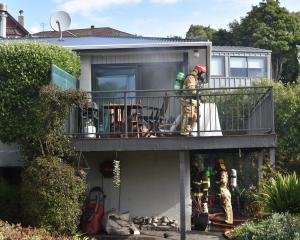

Speed, glass, ice, P or meth. These are just some of the street names given to methamphetamine - the synthetic drug ripping apart lives across New Zealand and, increasingly, right here in Otago. But one man has another name for the drug. He calls it "the devil". Rhys Chamberlain reports.
The man behind bars hides his problem well.

You would be none the wiser if you passed him in the street.
He is polite and articulate, and his appearance is of an average, mid-30s white man with a nice smile.
But he has skeletons in the closet, a shady past and a confession to make - he is addicted to methamphetamine.
• Meth danger may be understated
The Otago Daily Times met the man, who cannot be named, at the Otago Corrections Facility earlier this month.
And as he talks about his experiences with methamphetamine, the feeling it provides and his times using, it quickly becomes obvious the drug remains the love of his life.
He's clearly eager for it, even now, in the Otago prison's drug treatment unit (DTU).
His eyes bulge, he can't get the smile off his face and he's jittery - his legs constantly shaking at the thought of getting some "gear".
"I love the feeling in my stomach. I love the taste. It makes everything clearer. It's hard for me not to feed off that," he says.
But also, he says, "it's the devil".
"I would sell my mother for it."
His love for the drug has cost him dearly, including two failed relationships and five previous stints in prison.
And he is not alone.

Detective Senior Sergeant Malcolm Inglis, of the Southern district organised crime unit, said police dealt with methamphetamine-related crime on a "weekly basis" in Dunedin, and it was on the increase across the country.
"Meth is a No1 concern for the whole country, really," Det Snr Sgt Inglis said.
"We've seen numerous cases of it and it's very destructive. It's continually a priority for us to police."
Other agencies viewed alcohol as the No1 drug problem in New Zealand, but police focused on methamphetamine as its popularity continued to climb, he said.
"Meth is a class A drug and carries life imprisonment.
"It's considered right up there with murder."
The warning came after a $40 million shipment of methamphetamine from China was seized at Auckland Airport just last month, leading to the arrest of four men, and as media reports suggested it was now easier to obtain methamphetamine than cannabis on the North Island's East Coast.
But while the headlines were dominated by stories of big busts in Auckland, regional centres were not immune, Det Snr Sgt Inglis said.
That included recent arrests for methamphetamine-related offending in Waimate, Oamaru and Balclutha, highlighting the spread of the scourge.
Eight people were arrested in a single operation in Waimate in October last year and pregnant Oamaru mother Jasmine Jenner (23) was sentenced in Dunedin on 13 methamphetamine-related charges the same month. Three Southland men have also been sentenced in Dunedin after being arrested in Cumberland St in November 2014 and charged with possessing methamphetamine for supply.
A fourth man was to be sentenced on Thursday but failed to appear, resulting in a warrant for his arrest.
Statistics NZ figures showed 155 people were apprehended by police in the Southern district for supplying, administering or dealing methamphetamine or amphetamine between 2010 and 2014.
That compared with 777 people apprehended in the Wellington district, the most in the country, and 3193 people across New Zealand during the same period. Another 30 in the Southern district were apprehended by police for possession, compared with 215 in Auckland and 1350 nationally.
At the same time, an ever-increasing supply of ephedrine and pseudoephedrine tablets - used to manufacture methamphetamine - was making its way to New Zealand from overseas.
New Zealand Customs officials have seized almost 10 million tablets destined for the streets over the past three years, customs figures released to the ODT show.
Last year, Customs officers seized about 4.2 million tablets and 319 shipments of methamphetamine stopped.
But the figures don't describe the human toll wrought by the drug.
For the young man locked up at the Otago Corrections Facility, drug use within his family formed some of his earliest memories.
And, even now, recalling those memories is enough to bring tears to his eyes.
"I was just sort of brought up in a circle that was around it.
"My old man was a [heroin] home baker ... [I] watched him stick needles in his arm everyday.
"By maybe 15 or 16, I was smoking meth.
"I have dealt with it all my life. It's like second nature."
His father died of a heroin overdose about four years ago, but by then it was too late - he had already followed in his father's footsteps, becoming an addict and turning to dealing.
But methamphetamine is a costly habit in other ways, too, he says.
A "point" - a tenth of a gram - costs about $100, a gram $1000, and an ounce can cost up to $18,000.
The price went up the further south it was sold, meaning he could spend $1000 a day on meth.
That led to a life of crime - robbing people "to feed my drug addiction", he said.
He would source the drug from a range of people, including those "you least expect".
"It's not always the gangs ... These days quite a lot of people in high places are on it.
"The last person you expect can be doing it ... your next door neighbour.
"Nowadays, everyone is on it."
The spread of the drug and its distribution, including on Facebook, made finding it even easier, he said.
His methamphetamine addiction has led, inevitably, to a troubled life - expulsion from school at a young age, two relationships destroyed and six stints in prison, so far. When he used, he disappeared for up to two weeks at a time - leaving his family to wonder if he was dead or alive.
His latest partner has been "waiting" four years for him to get clean, even after they and their children moved to Invercargill to "get away from it", he says. It didn't work.
She has now given him an ultimatum. When he gets out of prison, he will be on his last chance, he says.
"I've destroyed two relationships with three kids and didn't really flinch too much to see the damage."

Another former Dunedin man who struggled with methamphetamine while living in Auckland agreed the drug had a destructive impact.
The man, now living in Rotorua, said he became distrustful, paranoid, self-absorbed and a "compulsive liar" at the height of his addiction about 2006.
The drug destroyed any relationships he had - apart from the ones he had formed with other users.
"You're living a lie. You do things to cover. You have to make up stories," he said.
"You don't really make much of an effort with relationships with people that aren't using because it doesn't benefit you in any way."
He normally spent about $200 a week on the drug, but at one point bought $3500 worth of methamphetamine with the intention of on-selling it for profit. Instead, such was the drug's pull, he ended up using it all himself.
The drug was now "rampant" and the Auckland market "flooded", but he managed to kick the habit two years ago after several relapses, a divorce and the loss of his job.
He vowed never to use again, although there were still "times that I think about it".
Once the damage was done, it was left to people like Otago Corrections Facility treatment unit team leader Thomas Moore to help pick up the pieces.
Mr Moore, who has 25 years as an addiction counsellor, was loath to say whether his programme would help meth addicts kick their habits.
Only 10% of prisoners who passed through the treatment unit returned, but that did not mean most were being rehabilitated. It just meant he did not see them again.
The unit housed up to 45 prisoners at once, all living in a "therapeutic community" environment, where they were encouraged to "speak freely" about their addiction.
Methamphetamine, alcohol and cannabis addictions were the most common among prisoners passing through the unit.
There was a "strong correlation" between drug use and offending, but the sense of community within the unit could help prisoners in their struggle against addiction, he said.
"Some people come back - it's inevitable. [But] it's very uncommon that they have learnt nothing."
Det Snr Sgt Inglis said police saw first-hand the damage caused by methamphetamine - crime, the impact on individuals and families, and "numerous examples of children found in the environment".
There was no quick fix, but the problem was not just one for police to address, he said.
"It should be a concern for the community," he said.
Southern District Health Board Community Alcohol and Drug Service (CADS) senior clinical psychologist Dr David Mellor agreed the community needed to work together to address the issue.
Just eight people, or 0.5% of CADS' total intake, cited problems with amphetamines, including methamphetamine, as their reason for attending the service's regular walk-in clinics since 2011.
That could reflect the fact many clients used multiple drugs, and did not cite methamphetamine in any request for help, but other users managed to avoid the attention of authorities, he said.
New Zealand Drug Foundation executive director Ross Bell also warned against reading too much into Ministry of Health figures, which indicated methamphetamine use had halved in the past four years.

Mr Bell was not convinced the problem was under control.
"The fundamental problem is that we don't have a good sense of what's happening across the country.
"It could well be in some parts of the country, meth use is increasing," Mr Bell said.
It took about seven years of regular use before a person got to a "psychotic" stage, and it was possible New Zealand was in the middle of a seven-year cycle, possibly explaining the drop in numbers, he said.
Misconceptions the drug was used only by "brown people in South Auckland" also needed to be tackled, as lawyers, doctors and bankers were also using it, he said.
"It's the perfect drug for people that want to have that work-hard, play-hard lifestyle."
Anyone wanting to blame the scourge solely on New Zealand's traditional gangs should also think again, experts suggested.
Motorcycle gangs and Asian crime groups had a major role to play, but so, too, did the internet and social media, Det Snr Sgt Inglis said.
There was "a strong crime link" to methamphetamine, and gangs remained "the main distributors", but individuals were also cooking and supplying the drug, he said.
"The problem is it's a money-driven industry. There is good money in meth.
"People who don't want to make an honest living will fall into this area of crime."
Most methamphetamine was manufactured in the North Island and shipped to Dunedin and other southern centres, but the use of the internet to buy methamphetamine was on the rise, he said.
Police were "continually looking" for suppliers through encrypted websites and on social media, including Facebook, which had "coded" pages set up to sell the drug, he said.
Massey University senior researcher and illegal drug research team leader Dr Chris Wilkins had also identified an "overwhelming increase" in people using social media and encrypted websites to buy methamphetamine.
The Illicit Drug Monitoring System (IDMS), a 10-year study of illicit drugs, showed methamphetamine's availability for regular users was now "quite high".
"You don't have to know a lot of people in a particular neighbourhood to get [it]," he said.
The country's "highly visible" motorcycle clubs and gangs might be blamed, but "I'm sure there's a whole lot of hidden people that may well be involved on a bigger scale".
University of Canterbury sociology co-ordinator Prof Greg Newbold, who has worked in prisons and with gang members, agreed gangs were a "major factor", but not the only one, in the drug's manufacture and supply.
"The big profits are being made by the Asian criminals because they can buy these precursors for a good price in the East," Prof Newbold said.
Dr Jarrod Gilbert, the author of Patched: The History of Gangs in New Zealand, said that had increased since pseudoephedrine became a restricted substance.
"Since pseudoephedrine became ... restricted, then you need international connections.
"We need to view drug crime as an issue of organised crime," Dr Gilbert said.
Denis O'Reilly, a Hawkes Bay community advocate and Black Power member, said individual members of some gangs were dealing, but entire gangs should not be tainted.
"Just because a gang member is involved doesn't mean that the gang is involved," Mr O'Reilly said.
He believed methamphetamine importation was driven by overseas crime groups, with individual gang members used for distribution.
But, whatever the source, the drug's trail leads almost inevitably back to Otago's prison, where the incarcerated addict faces a three-month stint for his latest transgression.
He hopes to get sober, but as he talks of self-awareness and accepting responsibility, it's clear he still has a long way to go.
"I could quite easily sell you a dream and tell you I won't go back to drugs but ... it's a life struggle.
"I'm going to fight it for the rest of my life. I'm a drug addict."
He also has some advice for people looking to dabble in methamphetamine: "It's not worth it. Stay away from it. It's the devil."












